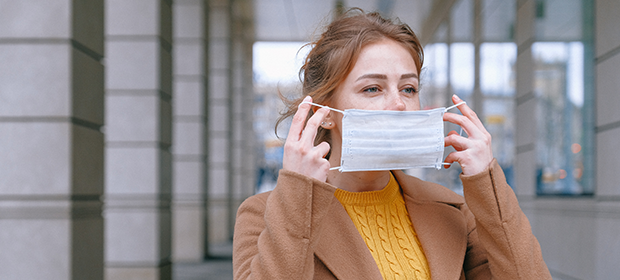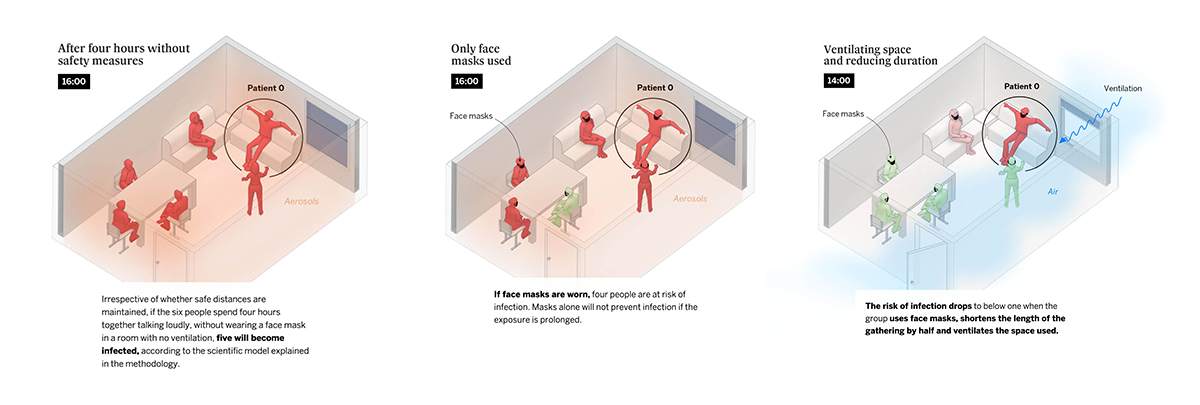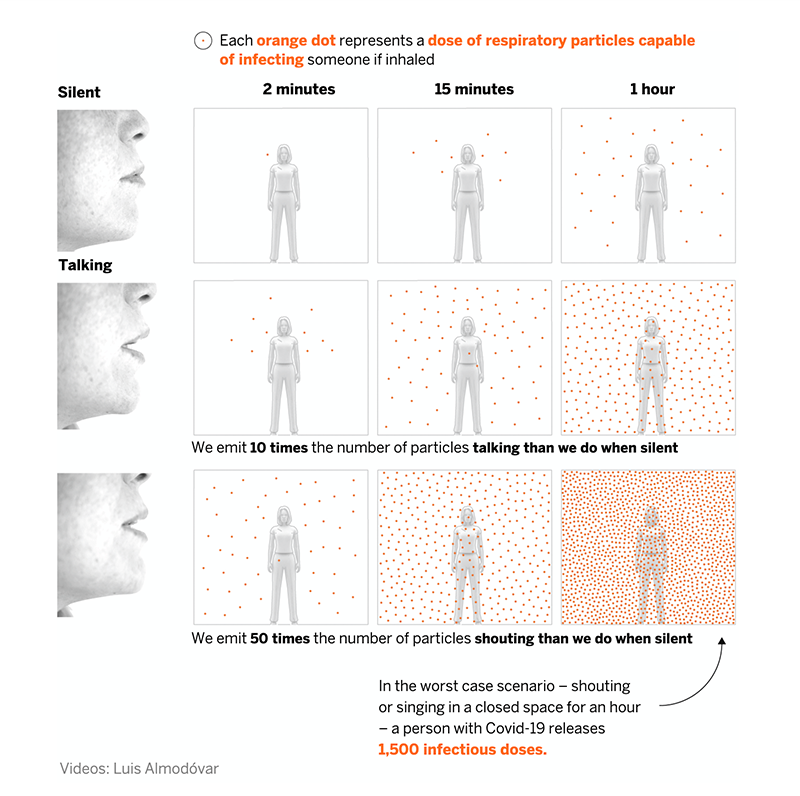As per current government guidance, if you can work from home you should do so. But if you have to have staff present in your office you should be taking measures to keep your team as safe as possible. And when we are permitted to return to the office we must all take precautions against the spread of the virus.

In this blog we’ll share some scientific findings and information on how we can stay safer in offices and help to prevent the spread of coronavirus.
Aerosol Transmission
In Lockdown 1 it became apparent that social distancing was the key to success. And while keeping 2m apart will certainly help with droplet transmission, it does not necessarily help with aerosol transmission.
We recently read a very well illustrated article about indoor transmission: A room, a bar and a classroom: how the coronavirus is spread through the air in the El Pais online publication. This highlights that the exposure to areosolised viral particles as an efficient vector for Covid-19, and as most offices in the UK are poorly ventilated in the winter, this is a serious consideration for offices who wish to bring employees back.

As you can see from the diagrams, masks help, but they do not help as much as ventilation. Of course with winter on our doorstep ventilation might not be the most popular choice in your office.
In addition, the way we interact in enclosed spaces can have a significant impact. With more aerosol being released by shouting and singing.

Preventing Aerosol Transmission In Your Office
- Work from home where possible. Reducing the number of staff in the office reduces the chance or exposure, helps to space people out and limits the number of your staff who may need to isolate for 14 days should someone test positive. Splitting your workers into teams and having different teams work from the office only on a certain days of the week helps to avoid overlap but also allows people to return to the office if they wish.
- Space out. Open plan offices will not work quite as well as older style office buildings with many rooms. If you have multiple rooms, try to reduce the people per room, ideally to one person per room.
- Open windows. The regular winter office debate over how warm or cold it is will have to wait for next year. Opening the windows is one of the safest way to work together in a room, so if you can bear it, work with the windows open, or at least open them hourly to get some air circulation. It may be feasible to add small electric heaters at each workstation to help keep staff warm with the windows open on the coldest days.
- Email, don’t call. We’ve all gotten used to the zoom chats and having to do business via phone, email and videoconference these days, but speaking, shouting and singing all increase transmission of viral particles. So if possible, move meetings to email or a live chat style platform.
Fomite Transmission (surfaces)
Back in Lockdown 1 we were also told that masks make very little difference, and the virus was being transmitted via surfaces. The message was clear – WASH YOUR HANDS! And while hand hygiene and cleaning of surfaces is still important, it now appears it is not the main route of transmission – with droplet and aerosol transmission accounting for most cases.
Still, it is advisable to keep up the good work when it comes to surface cleaning with alcohol or bleach products because this still presents a transmission risk.
Preventing Fomite Transmission In Your Office
- Cleaning. It goes without saying, the improved cleaning practices we’ve all had to adopt should be encouraged to continue. Communal items which are in frequent use like door handles, the coffee jug, and the WC facilities should be cleaned every few hours.
- Workstations. Hotdesking might not be the best solution at the moment, but if you have to use hotdesks, set up a procedure where staff clean the desk and equipment before and after their shift, just to be safe. If possible, keep separate desks and avoid using other staff members equipment. Things like pens, which often get passed around and picked up by accident, can be labelled with the employees name.
- Hand Sanitising. It’s still very important to wash your hands thoroughly. Provide ample soap and water, wash stations or hand sanitising stations for your staff. Encourage hand sanitising when people arrive and throughout the day.
The government guidance has been updated recently, if you haven’t accessed this yet you can download it here.
Download Guide For Offices and Contact Centres
And you can download the necessary Covid-19 Secure poster to display in your office here.

 © 2019 Warr & Co Chartered Accountants. Warr & Co Chartered Accountants is a member of The Institute of Chartered Accountants in England & Wales (ICAEW). Whilst the information detailed here is updated regularly to ensure it remains factually correct, it does not in any way constitute specific advice and no responsibility shall be accepted for any actions taken directly as a consequence of reading it. If you would like to discuss any of the points raised and / or engage our services in providing advice specific to your personal circumstances, please feel free to contact any one of the partners on 0161 477 6789 or contact us via our website forms. Warr & Co Chartered Accountants are registered to carry our audit work in the UK, our audit registration number is C002961684, for more information please visit www.auditregister.org.uk.
© 2019 Warr & Co Chartered Accountants. Warr & Co Chartered Accountants is a member of The Institute of Chartered Accountants in England & Wales (ICAEW). Whilst the information detailed here is updated regularly to ensure it remains factually correct, it does not in any way constitute specific advice and no responsibility shall be accepted for any actions taken directly as a consequence of reading it. If you would like to discuss any of the points raised and / or engage our services in providing advice specific to your personal circumstances, please feel free to contact any one of the partners on 0161 477 6789 or contact us via our website forms. Warr & Co Chartered Accountants are registered to carry our audit work in the UK, our audit registration number is C002961684, for more information please visit www.auditregister.org.uk.